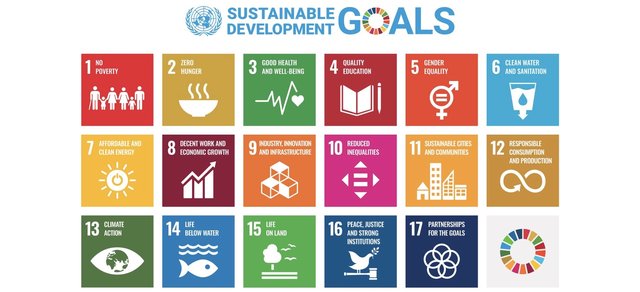The path to sustainable development runs through the Internet’s technical core. Beneath every digital service, every collaboration, and every step forward in how societies grow and adapt lies the infrastructure that supports progress in education, healthcare, governance, innovation, and more. The RIPE NCC doesn't implement the Sustainable Development Goals (SDGs) directly, but plays an important role by sustaining the Internet commons that enable digital innovation and cooperation in pursuit of them.
Over the past few years, the RIPE NCC has actively engaged in global discussions with governments and intergovernmental organisations on the future of the Internet, contributing to dialogues - from the Global Digital Compact to the WSIS+20 review and beyond - on Internet governance, digital sovereignty, and sustainable development.
A central aim of this engagement is to help bridge the language gap between the technical community and policymakers. Both groups often find themselves approaching the same challenges from different perspectives: one focused on protocols and operations; the other on governance and societal outcomes. Building a shared understanding helps ensure that policy decisions reflect the technical realities of Internet operations, while technical solutions align with broader development goals.

Mapping the work of the technical community to the United Nations Sustainable Development Goals helps establish a common language for engagement. It shows how technical coordination and policy cooperation reinforce one another, strengthening the Internet’s resilience, security and scalability while contributing to broader social and economic progress.
Sustaining the Internet commons
The Internet is built on two core principles. The first: open standards that allow devices and networks built on different technologies to interoperate seamlessly, guaranteeing global connectivity. The second: the registration of Internet identifiers (names, numbers, and ports) distributed through bottom-up, community-developed processes and governed independently of commercial interests to ensure their global uniqueness.
Together, these principles make the Internet a global platform for innovation, communication, and opportunity, enabling anyone, anywhere to build, connect, and create without relying on central control.
The RIPE NCC is one of five Regional Internet Registries (RIRs), serving Europe, the Middle East, and Central Asia. As a not-for-profit membership organisation with more than 20,000 members, it distributes and registers Internet number resources and provides the secretariat function that supports the RIPE community.
The RIPE community is a collective of network operators, academics, industry experts, and public-sector representatives who collaborate to develop Internet policies through an open, bottom-up process where anyone can participate, while the RIPE NCC implements these policies and ensures they work in practice. Internet coordination refers to the collaborative technical and administrative processes that enable the global Internet to function as a single, interoperable network.
As a Network Coordination Centre, the organisation proactively engages with Network operators, Industry associations, Internet Exchange points (IXPs) and Network Operators’ Groups (NOGs), to coordinate activities, support development and strengthen technical and community capacity across the Internet ecosystem.
Preparing Internet infrastructure to power the digital economy of tomorrow
Through its core activities, the RIPE NCC works to keep the Internet resilient, scalable, and secure.
Resilience is the Internet’s ability to adapt and recover when things go wrong. By distributing Autonomous System Numbers (ASNs), the RIPE NCC enables operators to connect to multiple providers through multihoming, peering, and robust interconnection. This diversity makes networks stronger and capable of routing around damage. The RIPE NCC also operates K-root, one of the 13 root name servers operated by 12 independent organisations, strengthening the resilience of the Domain Name System (DNS).
Scalability is what allows the Internet to continue growing. By distributing and promoting IPv6, the RIPE NCC expands the available address space to meet rising demand. At the same time, IPv4 and ASNs are distributed and registered under community-developed policies as well, with accurate and up-to-date registry data ensuring uniqueness and stability.
Routing security is about protecting the trust that global connectivity depends on. Through the Resource Public Key Infrastructure (RPKI), the RIPE NCC helps prevent hijacks and misconfigurations that could disrupt the Internet, reinforcing confidence in the Internet’s core infrastructure.
These functions are carried out in coordination with the wider Internet technical community, including standards bodies, operators, other RIRs and ICANN. Together, they do more than keep the Internet running - they make innovation possible. From the Internet of Things to cloud services, from digital trade to smart cities, every new development depends on strong technical foundations and coordination.
By providing open measurement and data services, the RIPE NCC enables operators, researchers, and policymakers to understand how the Internet is performing. This transparency strengthens stability today, while the RIPE NCC's participation in standards development and technical communities contributes to an Internet that can evolve to support emerging needs such as artificial intelligence, edge computing, and more energy-efficient infrastructure.
This is where the RIPE NCC’s impact on the Sustainable Development Goals is clearest. Through efforts that directly advance SDG 9 (Industry, Innovation and Infrastructure) and SDG 11 (Sustainable Cities and Communities), the Internet continues to evolve as a driver of sustainable innovation, economic opportunity and social progress.
Learning together, building together
The Internet’s future depends not only on resilient infrastructure but also on people who have the knowledge and skills to build and maintain it. This is where the RIPE NCC’s contribution to SDG 4 (Quality Education) becomes clear.
The RIPE NCC provides accessible learning opportunities across its service region through its training programmes and the RIPE NCC Academy. The Certified Professionals programme complements this by allowing engineers to demonstrate their expertise with recognised credentials. These efforts build technical capacity and help reduce barriers, contributing to more resilient and inclusive Internet infrastructure that can support communities across the region.
This capacity-building work ties directly back to Internet resiliency, scalability, and routing security. By equipping people with the skills to deploy IPv6, implement RPKI, strengthen routing security, and measure performance, the RIPE NCC helps ensure that the Internet continues to grow in a resilient, secure, and inclusive way. Providing education also helps reduce inequalities by giving more people the chance to contribute to and benefit from the Internet, no matter where they are based.
The RIPE NCC also works to lower barriers to participation. Fellowships, youth engagement, and academic initiatives bring new voices into the community and connect researchers, students, and early-career professionals with operators and policymakers. National and regional technical meetings and Internet governance forums provide further opportunities to learn, share, and participate.
Lowering barriers to participation and creating opportunities for new voices also advances SDG 10 (Reduced Inequalities), ensuring that more people can contribute to and benefit from the Internet.
Trust and good governance
The strength of the RIPE community lies in its commitment to good governance. The Policy Development Process (PDP) is open and bottom-up, enabling anyone to propose, discuss, and shape Internet policy. This inclusivity and transparency protect against capture by any single interest.
The RIPE NCC does not act as a government, business, or political actor. Its role is to provide neutral technical stewardship, ensuring that Internet number resources are distributed and registered according to community-developed policies.
Transparency is equally central to the RIPE NCC itself. Policies, financials, activity plans, audited statements and board minutes are all published openly, while community mailing lists are fully archived and accessible. This openness allows oversight and engagement by all stakeholders.
By maintaining accurate and trustworthy registry data, the RIPE NCC reinforces the integrity of the Internet’s technical core. Together, this transparency and collaboration across the technical community strengthen confidence in the institutions that coordinate the Internet, reflecting the principles of SDG 16 (Peace, Justice, and Strong Institutions) and paving the way for broader partnerships that support the Sustainable Development Goals.
Partnerships for the goals
The Internet itself is built on partnerships, and SDG 17 (Partnerships for the Goals) is reflected in the RIPE community. As its secretariat, the RIPE NCC helps bring together operators, policymakers, researchers, and civil society.
The RIPE NCC formalises cooperation through Memoranda of Understanding (MoUs) with governments, UN agencies such as the ITU and UNDP, intergovernmental organisations, academic institutions, and industry associations. These agreements support development by strengthening resilience, scalability, and routing security through capacity building and the exchange of best practices.
Across the community, the RIPE NCC supports Network Operator Groups (NOGs), academic conferences, and Internet Governance Forums (IGFs) at both national and regional levels. These platforms surface local progress and challenges in technical coordination, deployment, and governance, which can inform regional and global discussions at fora such as the Internet Governance Forum (IGF), the World Summit on the Information Society (WSIS), and the Global Digital Compact (GDC). Youth forums bring new perspectives, ensuring that future generations are included in Internet governance debates. Fellowships and training programmes lower barriers to participation, helping people from diverse backgrounds engage in shaping the Internet.
The RIPE NCC’s contributions align most directly with SDGs 9 and 11, and extend to SDGs 4, 16, and 17. Yet the impact of a resilient, secure and scalable Internet reaches across the wider SDG framework. By stewarding Internet number resources, the RIRs help ensure the Internet remains a trusted, global platform for innovation, one that enables governments, businesses, and communities to deliver solutions in areas such as education, healthcare, climate action, and equality. The RIPE NCC does not address these societal challenges directly, but helps create the technical conditions that enable digital innovation and cooperation. By maintaining the integrity of the Internet’s technical core and providing authoritative data, the RIPE NCC enables others to drive progress.
Ultimately, the Internet is a common good, and its strength comes from the people and communities who sustain it. The RIPE NCC’s work is part of the broader effort of Internet technical coordination. By strengthening the Internet’s technical core, it helps ensure that the Internet remains a platform for connection, innovation and opportunity for all.





Comments 0